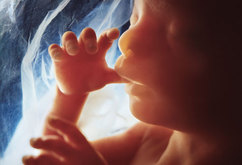
News headlines today highlight Brittany Maynard's decision to end her own life, many noting that she was an advocate of 'death with dignity.' What does that mean?
The Death With Dignity National Center, a non-profit advocacy group, says it this way:
"The greatest human freedom is to live, and die, according to one's own desires and beliefs. From advance directives to physician-assisted dying, death with dignity is a movement to provide options for the dying to control their own end-of-life care."
Dignity is about choice. Dignity is about freedom. Dignity is about control.
If this is true, you can have death with dignity. But you can't have life with dignity.
My mother and father brought me into this world through no choice of my own. Did I have the freedom to choose whether I existed or not? Certainly not. Did I have control over when I would be born, to whom, or where? Did I have control over what kind of species I would be, over my body type, my genetic susceptibility to certain forms of disease, my hair color, my height? Good grief--I don't even have a say over the thickness of my toenails and fingernails! Is my dignity really found in my choice, my freedom, my control?
If nothing is less dignified than being out of control, without choice, without a say in the matter, then all of us begin utterly devoid of dignity and spend most of our days there.
But what if dignity is not first and foremost expressed in my choice but in being given a gift I did not and could not choose? What if dignity is not about what I actively choose but what I cannot help but passively receive? What if I am not my own, body and soul, life and death, from beginning to end?
My only reasonable response, then, would be a grateful heart and a commitment to be a living sacrifice, a thank offering offered up daily to the end of my days. For in gratefully receiving that which I could not choose, I become increasingly free.
The Death With Dignity National Center, a non-profit advocacy group, says it this way:
"The greatest human freedom is to live, and die, according to one's own desires and beliefs. From advance directives to physician-assisted dying, death with dignity is a movement to provide options for the dying to control their own end-of-life care."
Dignity is about choice. Dignity is about freedom. Dignity is about control.
If this is true, you can have death with dignity. But you can't have life with dignity.
My mother and father brought me into this world through no choice of my own. Did I have the freedom to choose whether I existed or not? Certainly not. Did I have control over when I would be born, to whom, or where? Did I have control over what kind of species I would be, over my body type, my genetic susceptibility to certain forms of disease, my hair color, my height? Good grief--I don't even have a say over the thickness of my toenails and fingernails! Is my dignity really found in my choice, my freedom, my control?
If nothing is less dignified than being out of control, without choice, without a say in the matter, then all of us begin utterly devoid of dignity and spend most of our days there.
But what if dignity is not first and foremost expressed in my choice but in being given a gift I did not and could not choose? What if dignity is not about what I actively choose but what I cannot help but passively receive? What if I am not my own, body and soul, life and death, from beginning to end?
My only reasonable response, then, would be a grateful heart and a commitment to be a living sacrifice, a thank offering offered up daily to the end of my days. For in gratefully receiving that which I could not choose, I become increasingly free.
 RSS Feed
RSS Feed